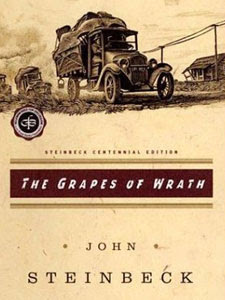 This is the first book that I've read this year that was already on my book list. All the other ones I heard about from other book blogs or other recommendations, but of course, The Grapes of Wrath is a classic and one that I'd always intended to read but never actually done so. After reading East of Eden and Travels with Charley last year, I wanted to get some more Steinbeck so I'd asked for this for Christmas. This was actually the first book I started this year, but it's taken me this whole time to finish it because it's so big and heavy (in multiple ways).
This is the first book that I've read this year that was already on my book list. All the other ones I heard about from other book blogs or other recommendations, but of course, The Grapes of Wrath is a classic and one that I'd always intended to read but never actually done so. After reading East of Eden and Travels with Charley last year, I wanted to get some more Steinbeck so I'd asked for this for Christmas. This was actually the first book I started this year, but it's taken me this whole time to finish it because it's so big and heavy (in multiple ways).
In On Writing, which I read in the middle of this, Stephen King says something like, "Don't feel bad if you can't write anything as good as The Grapes of Wrath your first time around." I laughed when I read that because I was about halfway through with this book and I was struggling with it because of all the breaks in the narrative where he inserts those chapters of generalizations and descriptions of all the migrant people, and I told Tommy that it was just too much for me to want to finish. But I ended up getting back into it as the book wore on-- you can't HELP but feel for the Joads and be horrified by what they're going through. Every time they find another job, they get all hopeful again, and every time they get shot down and run out of money again and are back where they started. And they lose members of their family all along the way. Everything just seems so pointless and hopeless. But the more I think about it, the more hopeful the ending becomes and the more the symbolism of rejuvenation sticks out. And that's what I liked about East of Eden too.
I think I'm going to need to read a few quick books next to balance out this heavy one, but I'm still really glad I read it. It IS a real must-read.




